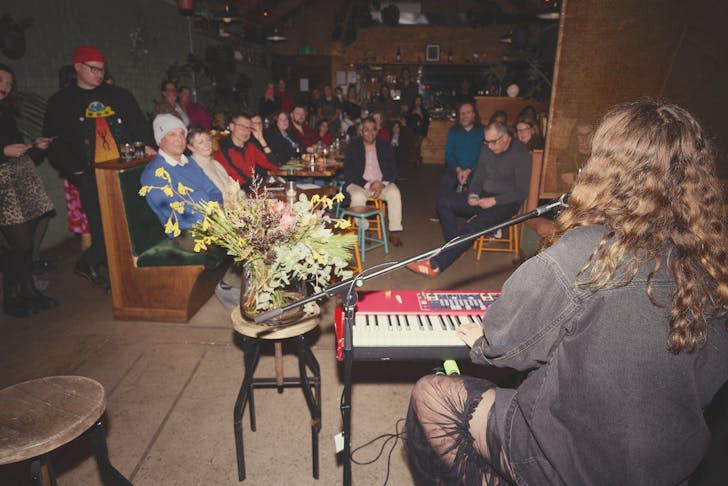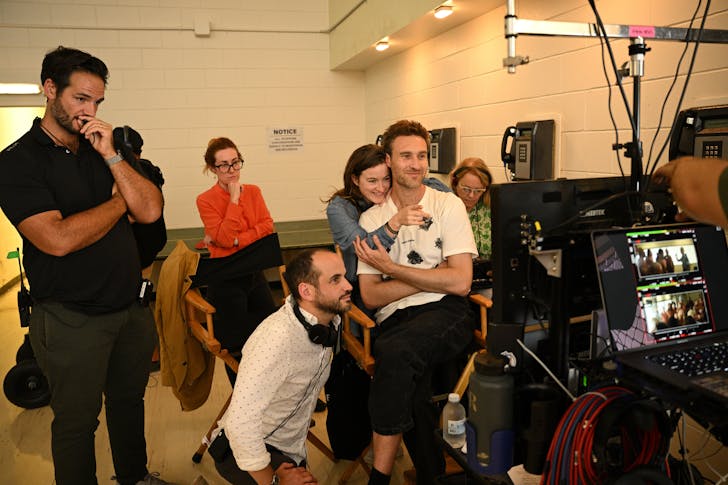Purposeful Leisure: Meg Washington And Nick Waterman Are Finding Creative Freedom On The Gold Coast
Take a seat as we chat with cultural icons, AACTA-nominated filmmaker Nick Waterman and ARIA Award-winning musician Meg Washington. This duo is deeply ingrained in Australia’s creative scene, from their collaboration on BINGE film How To Make Gravy to Meg’s voicing of beloved Bluey character Calypso. Here, the creative couple share their love for life on the Gold Coast.
On the Gold Coast, nature takes centre stage—lush ancient rainforests, cerulean waters, and kaleidoscopic sunsets.
But beyond the beauty, there’s a quiet sophistication emerging—a burgeoning arts community that blends surf culture, soulful creativity, with a conscious connection to the natural world.
Embracing The Slow Life
We recently moved to the Gold Coast, and in the short time we’ve lived here, we’ve enjoyed getting to know this incredible part of the world.
We’ve been learning the rhythms of our new neighbourhood, and waking up to new sounds; we now hear kookaburras where we used to hear inner-city crows. And although the garage is still full of unpacked boxes, there are a few things we’ve already begun to notice.
People, in general, seem to be much happier here. We’ve also noticed that our phones hate the beach—we love that sand and salt are not natural bedfellows with technology.
We first lived here for three magical months in 2023 while filming How to Make Gravy, and we were lucky to feel welcomed by the Goldiewood community, especially by our friend Schuyler Weiss, who was the film’s lead producer.
As well as the world-class film facilities and talented crew, during that time, we were struck by how easy it was to find moments of stillness.
Image Credit: Nick Waterman and Meg Washington | How To Make Gravy Set
5am swims before heading to set. Weekends spent at the beach with our son. Being in close proximity to nature brought a genuine benefit to our lives, and we really felt the difference.
Seeking Slower Rhythms
But it’s not just happening in the entertainment industry. More and more families from all walks of life are quietly leaving the major cities in search of a slower, saner rhythm. Places where nature and leisure are accessible. Where reflection isn’t a luxury but a built-in part of the day.
It’s the 21st-century dilemma that we’re all faced with—the impossible work/life balance. The constant interruption of technology, digital noise, the pressure to always be ‘on,’ to be connected, and constantly available.
As the world continues to spin at warp speed, there’s a case to be made for slowing down.
Leisure is not idleness. It’s the condition in which imagination and consciousness are cultivated. As Virginia Woolf once wrote, “A woman must have money and a room of her own if she is to write fiction.” But beyond the literal room, Woolf points to the essential: a space of leisure, undisturbed, where the mind is free to wander, to observe, to imagine.
Without leisure—real, unstructured time—there's no room for originality. Even Aristotle declared that. “We work to have leisure, on which happiness depends.” Leisure, in this view, was the end, not the means. It was the space in which the soul could flourish.
Re-Framing Leisure As A Necessity
Modern life has inverted this truth. We treat leisure as a guilty pleasure. But without leisure—and the proximity to nature that often defines it—we become fragmented, disconnected not only from the Earth but from our deeper selves.
To walk by the sea, to sit beneath a tree, to do nothing but listen—this is not wasted time. This is the ground of inspiration, the place where thinking expands beyond survival and begins to align with the deeper rhythms of the universe.
For us, now, it’s hard to ignore the call of the ocean when we know it's just a few minutes away. The smell of salt. The rhythmic push and pull of the shifting tides. There's something ancient in its call—a primal connection.
To reclaim leisure is to reclaim our full humanity. To seek nature is to remember we are part of it. In these spaces, we don’t escape life—we finally return to our animal existence. We cannot be merely productive animals. We must be receptive beings.
Nature, in its eternal constancy, invites us back to ourselves.
We're still making things. In fact, we’re making even more things than ever, in a way that now makes guaranteed space for leisure. We’re currently writing our next project, which is a musical feature film. It’s a tragic love story inspired by a brilliant and notorious Australian woman. Meg is touring nationally for the first time in many years and will release her 5th LP in August.

Photo Credit: Meg Washington Performing at Urban List Under The Influence Album Listening Party | Melbourne
In between the concentration of Zoom calls, the chaos of family life, the very unglamorous travel of tour, and the treasured moments of creative solitude, we are taking more walks in our local national park and making it mandatory to swim on sunny days, even if it’s just a quick dip.
It's not about checking out. It's about checking in. Because in the end, freedom isn't just about having more time. It's about choosing how you spend it.
And for us, the ocean is a pretty good place to start.
Meg Washington's fifth studio album, GEM, was released on 8 August 2025. You can purchase the vinyl now on her website.

